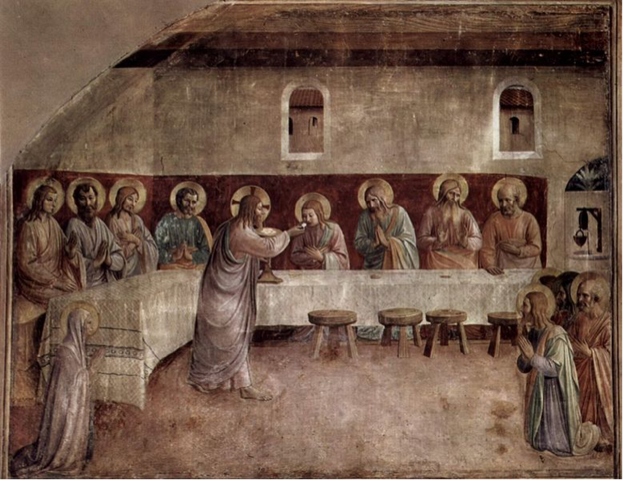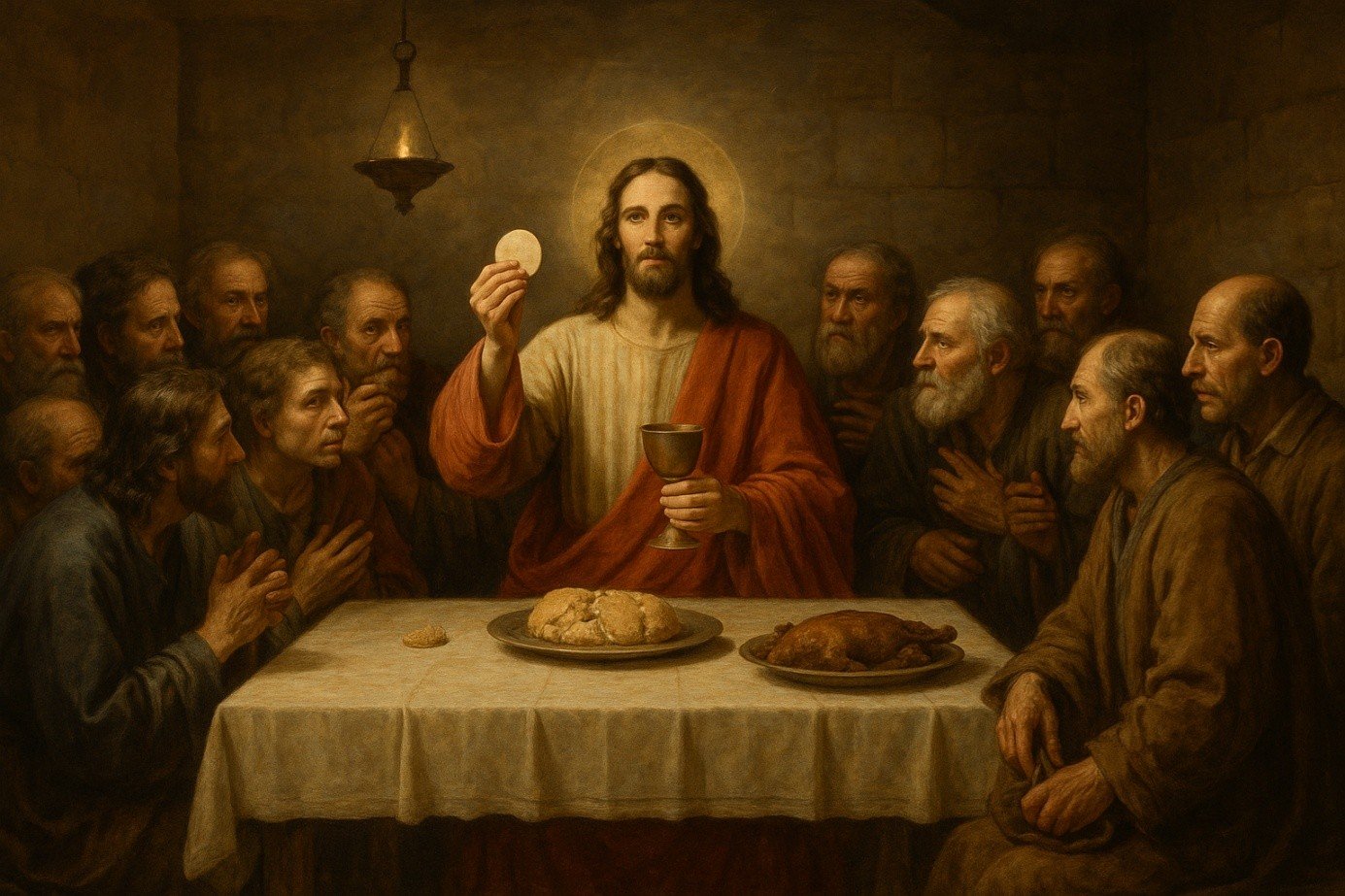
Gospel according to Saint John 6,51-58
Jesus said to Jews: «I am the living bread which has come from heaven; whoever eats of this bread will live forever. The bread I shall give is my flesh and I will give it for the life of the world».
The Jews were arguing among themselves, «How can this man give us flesh to eat?». So Jesus replied, «Truly, I say to you, if you do not eat the flesh of the Son of Man and drink his blood, you have no life in you. The one who eats my flesh and drinks my blood live with eternal life and I will raise him up on the last day. My flesh is really food and my blood is drink. Those who eat my flesh and drink my blood, live in me and I in them. Just as the Father, who is life, sent me and I have life from the Father, so whoever eats me will have life from me. This is the bread which came from heaven; unlike that of your ancestors, who ate and later died. Those who eat this bread will live forever».
Eucharist: A personal and communal miracle.
Luis CASASUS President of the Idente Missionaries
Rome, June 11, 2023 | The Most Holy Body and Blood of Christ
Dt 8: 2-3.14b-16a; 1 Cor10,16-17; Jn 6,51-58
A story, which I doubt is true, tells of a priest (whose good intention I do not doubt) who was celebrating the Eucharist in a small, rather poor neighborhood of a large city. And, after a slight earthquake, he noticed that the small house of an elderly couple had been severely damaged, especially the roof.
When he returned the following Sunday to celebrate Mass, he noticed that the situation had not changed. So it was the following Sunday. After three weeks, not observing any change, he concluded his homily at Sunday Mass by saying: I am very sorry, but from now on I will never come to celebrate the Eucharist with you. He was asked if he had been transferred to another place and he replied: No, it is just that there is no point in celebrating Mass here, because you are not Christians. You come here massively to receive communion, but no one has lifted a finger to help this old couple, your neighbors.
—ooOoo—
Perhaps this anecdote will help us to better understand what St. Paul said to the Corinthians and what the Second Reading reminds us of today: The bread that we break, is it not a participation in the body of Christ? Because the loaf of bread is one, we, though many, are one body, for we all partake of the one loaf.
When we listen to Christ in today’s Gospel, it is important to remember that he is speaking words of farewell. If a loved one speaks to us in his last moments, when he is about to die, he is undoubtedly speaking from the heart, with the intention of conveying to us what he considers most important at that hour, when he contemplates his whole life and wishes to share something that he especially wants us to hear.
Both Jesus himself and St. Paul speak to us today of unity, a form of unity that deserves deep and serene meditation. Let us make no mistake, let us not remain in contemplation of the sad reality of conflicts between human groups or countries. Christ is interested, in his last hours, in ensuring unity among us, families, religious communities or parishes. This is what he is especially concerned about and this is what he wants to ensure by giving us his Body and Blood.
But let us not forget that he does this with a highly relevant sign: breaking and sharing something as simple as bread. It is not simply his presence; it is his shared presence in the midst of our need. It is not the same to share a luxurious cocktail in a hotel, served by an Embassy, as it is to break in two with a friend the only sandwich we have left after a long walk, at dusk in the mountains. Even if it is not a banquet, we will both look at each other happily and that sandwich will unite us in a simple but authentic joy.
The above may not be a very elegant metaphor for what the Eucharist is, but we should close our eyes and feel more united to those who have come with us to receive Christ, waiting attentively for what he wishes to do in our hearts.
It is painful to contemplate the disunity among people who desire good, who have abandoned many things of the world to dedicate themselves to others or even to do so in the name of Christ. Yes, it is easier to see the presence of Christ in the Sacred Host than in the person who systematically contradicts me, who speaks ill of me, or who continually brags about of his generous gestures of yesterday and today.
Christ makes every conceivable effort to demonstrate that he is among us and in each of us in equal measure. By breaking bread at the supper with the disciples of Emmaus, he succeeded in bringing them back to Jerusalem with the community. By becoming flesh and blood at every Eucharist, his intention is the same today. Some of us may be seeking only personal strength and consolation, and it does not occur to us that very act of coming to the altar to receive him is already the beginning of a stronger unity among us.
—ooOoo—
Given that this presence of Christ in the Eucharist is a mystery and that many people, including Christians, do not contemplate it as anything more than metaphorical, it is important to remember once again that a mystery is not something that a detective faces in a novel and ends up discovering who the murderer is, nor is it a hidden truth that is eventually uncovered by scientific research.
Sometimes, the meaning of “mystery” has been explained with a simple analogy: Suppose you and I are at a reception. Then, Andrew arrives and greets Carlos effusively, giving him a hug. And I say in astonishment: Look, what a thing to see. Then you answer: What is so strange about an affectionate greeting? Then I reply: Andrew and Carlos have been enemies for thirty years.
That embrace is more significant than it seems at first glance. A mystery leads us to see beyond the apparent. According to the Second Vatican Council, the Church is first and foremost a mystery (Lumen Gentium 1-8). A mystery is something to be contemplated and lived. It is valuable, in and of itself, as a source of endless wonder. Although a mystery transcends human knowledge, it is not meaningless.
When we receive the Eucharist, walking to the altar, placing the consecrated host in our mouth, hearing the words “The Body of Christ,” seeing others make the same gestures, should help us to understand that Christ is struggling to show us that he is walking with us and that only with him is unity among us possible.
But unfortunately, sometimes we do not penetrate into the mysteries, we simply cover their light with admiration, rites or reasoning.
Many ages ago, so the story goes, a family clan acquired a jewel of priceless value. Its beauty and power were of unsurpassed quality. In order to safeguard it, the family placed this jewel in a jewel box crafted with exquisite care. The next generation marveled not only at the jewel but also at the beautiful jewel box. For safekeeping, it made a larger jewel box in which it put both the jewel and the first jewel box.
As ages passed, generation after generation saw the making of more and ever larger jewel boxes until at last a great and magnificent treasure chest had been built, itself adorned with intricate carvings, precious stones, artful symbols, and religious paintings. The family clan, now grown quite large, was very proud of its noble inheritance. Outsiders, too, would come and admire the antique beauty of the enormous treasure chest. “How fortunate you are, they would often say, to possess such a truly rich tradition. Then one day someone asked: By the way, what is in the treasure chest? No one could offer a clear answer. Few seemed to know for sure.
This explains why our Father Founder told us:
It is one thing to think of the Eucharist, and another thing to be Eucharist. It is the Eucharist that gives us spiritual immutability in all the trials of life so that this union is consolidated and becomes so intimate and indissoluble that the soul reaches a full assurance of never moving from this state. This is the Eucharist (FEB 26, 1961).
On that occasion, our Founder also told us that the transformation brought about by the Eucharist is such that it produces an aversion to everything that is not Christ. Just as we began this reflection by saying that there are examples of people (…perhaps you and I) who do not take advantage of the power of the Eucharist, it is also true that many saints have obtained an extraordinary benefit from their fidelity to this sacrament.
One fruit stands out for its visibility and importance, protection from sin. Hence the above quote from our Founder and what we proclaim at Holy Mass: This is the Lamb of God who takes away the sin of the world.
Thus, the Eucharist has some personal graces associated with it, which prepare our hearts for the things of God and also the grace of unity, which allows us to give the sign of being true followers of Christ, beyond our activities and words.
Today, in the First Reading, a heartfelt invitation is addressed to the people: remember, do not forget. Look at your past, consider what God has done, keep in mind his works of salvation.
In the desert the manna was a mysterious, unknown and unexpected food. It miraculously appeared in the wilderness. God taught simplicity, the essentials to his people. He made them understand what are the basic needs and what stems from avarice, greed, craving for possession and power. The induced needs, the superfluous, the sloth, and the life of pleasure move people away from God. This is what happens to us, who have had the grace and privilege of receiving the faith.
During our exodus to the heavenly dwelling God offers also to us a completely new food, other than those that man has always known and experienced, a food “coming from the mouth of the Lord” coming from heaven like manna: his Word become bread.
In speaking with young people and adults, one notices today, certainly more than at other times, a lack of conviction about the need to receive the Eucharist, much more so with regard to the traditional advice for a good prior preparation, such as, for example, those we see in the works of St. Francis de Sales.
Probably, more than any theological explanation, what can lead us to a deep affection for this sacrament is to remember that the Eucharist is the only observance for which Christ personally gave detailed indications, placing the bread and wine as natural elements and vectors of his blood and flesh.
We receive the Eucharist because He personally asked for it; He strongly recommended it as a means of salvation and unity. Besides what we can say about the Eucharist, it is certainly a true gesture of friendship with Christ… which He had before with us.
I would like to conclude with an observation of something we may forget, the immediate relationship of the Eucharist to the apostolic life. Each of us can draw his own conclusions:
Whenever you eat this bread and drink this cup, you proclaim the Lord’s death until he comes (1Cor 11: 26).
_______________________________
In the Sacred Hearts of Jesus, Mary and Joseph,
Luis CASASUS
President













